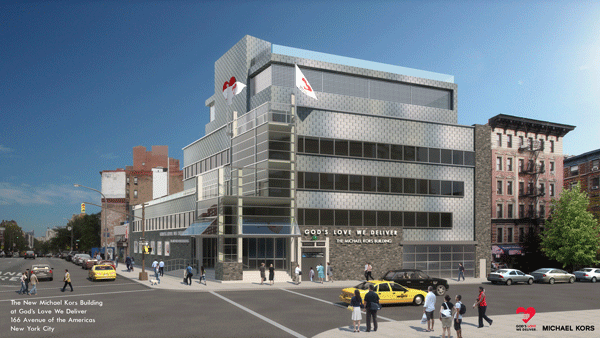
BY LINCOLN ANDERSON | God’s Love We Deliver is embarking on an ambitious project to more than double the size of its Soho headquarters building at Spring St. and Sixth Ave. When completed, the $22 million project would allow the organization to cook and deliver twice as many meals as it currently does to individuals afflicted with H.I.V./AIDS, cancer and other serious illnesses.
The new, five-story building would sport a rooftop garden for vegetables and herbs that would be used in the food the group delivers to its clients. Volunteers — including possibly even residents from a 14-story luxury tower planned on an adjacent site to the north — would tend the rooftop garden. In addition to its open rooftop, the new God’s Love We Deliver building would have setbacks and these would also sport garden plots.
The existing G.L.W.D. building’s distinctive red brick would be replaced by a grayish surfacing called “church stone.” Its loading dock on Spring St. would be enclosed, making things quieter for neighbors as the trucks load up with food deliveries. The current roof would be removed and new footings added to accommodate the additional stories.
Although the exterior of the northbound Spring St. subway entrance would be spruced up as part of the work, G.L.W.D. officials said the M.T.A. has told them there would be no need to close the entranceway — not even for a single day.
The organization hopes to start the project next April and complete it within 14 to 16 months. G.L.W.D. would temporarily relocate during the construction period, allowing it to continue its operations without any break in services.
G.L.W.D. officials laid out the plan in detail to The Villager on Monday morning. The story was embargoed from publication until later that evening, when fashion designer Michael Kors presented a $5 million gift to G.L.W.D. at its gala. Kors’s is the largest single donation in the organization’s history, in recognition of which, G.L.W.D.’s Soho headquarters will be named The Michael Kors Building.
G.L.W.D. started 26 years ago at the height of the AIDS crisis. The group purchased its Soho building from the city at auction for $535,000 in 1993. Originally an M.T.A. garage, the structure had most recently been a library for the blind and was vacant before G.L.W.D. took it over.
This year G.L.W.D. is on track to deliver 1.1 million meals in New York City, as well as Hudson County and Newark. In addition to providing food to people with AIDS and cancer, G.L.W.D. also feeds individuals afflicted with Alzheimer’s disease, multiple sclerosis and kidney and cardiovascular health issues. The group has a veritable army of 8,000 volunteers who help pack and deliver the nutritious meals.
A key part of the organization’s mission is to never have a waiting list for its services. Also, the group provides food not only to the affected individual, but, in the case of a sick parent, for example, the children will also get the free meals, the reasoning being that a parent’s debilitating illness impacts the whole family. If a senior gets a meal from G.L.W.D., his or her caregiver receives one too.
However, in the last five years, the group’s operation has grown by 60 percent, creating a major strain.
“Our kitchen is too small,” said Karen Pearl, G.L.W.D. president and C.E.O. “Our delivery area is too small. We have converted four offices into freezers and refrigerators.”
Three years ago the organization started searching for a solution to allow it to continue fulfilling its mission as it continues to grow.
The decision was made to expand at the current Soho site. However, some had advised G.L.W.D. also to build residential apartments on top of its location as a way to provide revenue. What G.L.W.D. ultimately decided to do instead was to sell some of its air rights to a developer who is building a new 14-story tower to the north — on a parcel composed of a vacant lot and a vacant, one-story, former Sleepy’s mattress store. This deal, which is still being finalized, would create an “operational endowment” to help G.L.W.D. weather the period when it has to relocate to a swing space during the reconstruction project.
G.L.W.D. has been fundraising for the project for the past year and a half, and Kors’s gift now brings the total to $20 million. G.L.W.D.’s board has committed to a campaign to raise a total of $25 million, which will also cover the operational endowment.
In an unusual twist, the open-space requirement of the adjacent planned apartment building will be fulfilled by G.L.W.D.’s garden rooftop. To access the social-service organization’s garden rooftop, the residents would cross G.L.W.D.’s third-floor rooftop, then take an elevator up to the fifth-floor rooftop. G.L.W.D. officials don’t know if the residents will actually want to volunteer in the organization’s garden rooftop — though they hope they will — but this access will be provided to meet the open-space requirement.
However, because the G.L.W.D. property carries a restriction for community use, the organization must apply for what’s known as a “minor modification” to allow the neighboring residents to access the rooftop garden.
This application will first be checked by the City Planning Commission to ensure that it’s in order. Then Community Board 2 will weigh in on the application, after which it will return to City Planning for a verdict. As opposed to a seven-month long ULURP review, this process will only take 45 days. G.L.W.D. intends to begin the process later this month.
The project that G.L.W.D. plans is 41,000 square feet. G.L.W.D. could, however, develop up to 66,000 square feet on its own property, but instead plans to sell 19,000 square feet of air rights to the adjacent development project. At the going rate of $200 to $300 per square foot, this would mean $3.8 million to $5.7 million for G.L.W.D.
Pearl and Lee Silberstein, a P.R. representative representing G.L.W.D., said the developer of the adjacent property, QT Soho Realty, LLC, could, under current zoning, construct a building up to 17 stories tall, even without using any of G.L.W.D.’s air rights. But, they said, the developer instead is planning to build only 14 stories — though the building would be bulkier thanks to the added air rights.
“It’s fair to say that they’re trying to work with God’s Love,” Silberstein said of the developer. “I think they recognize the value of the organization.”
“From the very beginning they saw this as a partnership,” Pearl said of QT Soho Realty. Of the developer keeping the apartment building at 14 stories, instead of going up to 17 stories, she added, “I think they were very conscious of wanting to be a good neighbor to us.”
The G.L.W.D. property is zoned for residential, commercial and community-facility use. However, prior to its sale in ’93, the property was restricted forever to community use. In addition, certain types of community facilities were banned at the location — such as schools, religious facilities or doctors’ offices — because Soho residents opposed uses that would bring in a lot of people.
Andrew Berman, executive director of the Greenwich Village Society for Historic Preservation, is charging that the air rights transfer might violate the property’s restriction.The residential project site is also within the proposed boundaries of the South Village Historic District that G.V.S.H.P. has been pushing for the city to designate.
According to Pearl and Silberstein, if the air rights were used to build above the G.L.W.D. property, then, yes, they would have to be used for community-facility purposes. But if the air rights are transferred, they said, they can be used residentially, for example.
On the other hand, they said, if G.L.W.D. wanted to add residential units on top of its own property, that plan would, in fact, have to go through a lengthier ULURP review.
“People had proposed putting residential on top of our own building,” Pearl said. “But our board made the decision that that’s not what we’re here for — to run apartments — that we’re here to cook and deliver nutritious meals.”
Plus, the air rights sale to the adjacent property would provide revenue to help G.L.W.D. continue its community-minded mission, so is in keeping with the spirit of the deed restriction, Pearl noted.
On Oct. 1, Berman wrote a letter expressing his concerns to Amanda Burden, chairperson of the City Planning Commission, and Robert Tierney, chairperson of the Landmarks Preservation Commission.
“The latest planned 14-story building at 180 Sixth Ave. is particularly concerning for a variety of reasons,” the preservationist wrote. “It would replace several one-to-four-story buildings, some of which (already demolished) were nearly 200 years old. It is surrounded largely by three-to-six-story buildings, which it would tower over precipitously. It utilizes development rights from the God’s Love We Deliver building at 170 Sixth Ave., a formerly city-owned property given to this invaluable social service agency with the stipulation that it only be used for a community facility/social service. The utilization of its development rights for a private luxury residential development seems to contradict the terms under which this public resource was given away, and its comportment with those terms should be thoroughly reviewed.”
Berman said his group is researching to determine whether the air rights transfer is permissible for a residential project.

































